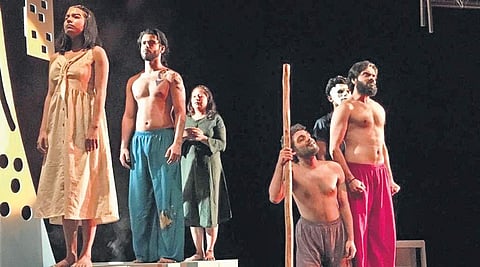

When Niloy Roy narrates the script of Antigone, the main protagonist on whom the play is named, feels like an Urban Naxal in the present day context as she is the voice of dissent against Creon, the antagonist. Antigone is condemned repeatedly for raising her voice against the state, getting herself labelled as an anti-national. To be staged at the Summer Theatre Festival at Shri Ram Centre on Thursday, the Greek tragedy directed by Roy, and has been adapted in socio-political context of current times. “Antigone is all about conflict. Taking this as the main device, we’ve developed the play, weaving in elements of democracy and anarchy. It focuses on the conflict between an individual and the establishment,” says Roy.
In the play, written by Sophocles in 440 BC, Antigone has two brothers named Eteocles and Polyneices.
The two kill each other during a civil war for the throne of Thebes. Antigone’s uncle Creon becomes the new king and decrees that Eteocles will be given proper burial rites, while Polyneices will rot unburied. Antigone tries to persuade her sister Ismene to help bury Polyneices, but Ismene is an obedient girl who refuses to defy Creon. Determined Antigone decides to single-handedly bury her brother but is caught in the act; for her crime she is buried alive.
Roy draws similarity between the noise surrounding anti-nationals and nationals and the tragic end Antigone meets for her rebellion, “Her views are not majoritarian but voice of dissent cannot be termed anti-state. Powers that be must understand this and it is their imperative duty to let such people exist. The essence of a real democracy lies in a thriving opposition, not in crushing it,” he says. Roy also feels that anarchism is the newest norm to subjugate constitutional voices and Antigone is as true as ‘death’, making the play timelessly relevant in modern times.
The play, however, defies geographical boundaries – from the sets to the costumes, the form is not set in a particular country. It does cover some significant elements of democracy that hold bearing world over. “We have covered religion that swings wherever to support powers that be. There are visible shades of nationalism in the way Antigone is censured for having a spine, as also how the rights of the individual are trampled upon. In Ismene, we see herd mentality to follow the king blindly,” Roy shares. Is Ismene the andh bhakt? Roy smiles, “As I said, Antigone is universal because anyone who differs from the state is vulnerable in contemporary times. It will still be open to the audience to interpret it the way they want.”
Antigone will be staged at Shri Ram Centre on Thursday (June 13) at 7PM